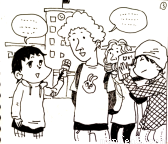题目内容
The girl was hanging by her hands from the railings of a balcony(阳台的栏杆). The balcony was on the twelfth floor of the high-rise block next to his. His flat was on the ninth floor and he had to look up to see her. It was half-past six in the morning. He had been awakened by the sound of an aircraft flying dangerously low overhead, and had got out of bed to look. His sleepy eyes, moved from the blue sky which was empty of cloud, empty of anything but the bright disappearing arrow of the aircraft, and then rested on the hanging figure.
He really thought he must be dreaming, for this sunrise time was the hour for dreams. Then, when he knew he wasn’t, he decided it must be a scene in a film. There were cameramen down there, a whole film unit, and all the correct safety precautions had been taken. Probably the girl wasn’t even a real girl, but a dummy(假人). He opened the window and looked down. The car park, paved courts, grass spaces between the blocks, all were deserted. On the balcony rail one of the dummy’s hands moved, desperately. He had to believe then what was obviously happening. The girl was trying to kill herself. She had lost her courage and now was trying to stay alive. All these thoughts and conclusions of his occupied about thirty seconds. Then he acted. He picked up the phone and dialed the emergency number for the police.
The arrival of the police cars and the rescue of the girl became the focus of talk for the people of the two blocks. Someone found out that it was he who had called the police and he became an unwilling hero. He was a modest, quiet young man, and was in relief when the talk began to die away. Again he was able to enter and leave his flat without being pointed at as a kind of St George and sometimes even congratulated.
About a fortnight after that morning, he was getting ready to go to the theatre, just putting on his overcoat, when the doorbell rang. He didn’t recognize the girl who stood outside. He had never seen her face. She said, “I’m Lydia Simpson. You saved my life. I’ve come to thank you.”
1.What did the man do first after he got up?
A. He looked down from the window.
B. He went to see the noisy aircraft.
C. He called the police to save the girl.
D. He hurried to check who was outside.
2.The moment the man saw the girl hanging there, he felt it was _________.
A. scaring B. desperate
C. unbelievable D. dangerous
3.We can learn from the passage that __________.
A. the man disliked to be talked about
B. the girl was unwilling to be rescued
C. the police arrived quickly on the scene
D. the girl was actually an actress in a film
1.B
2.C
3.A
【解析】
试题分析:本文讲述了一个男子意外救了一个爬在阳台栏杆想要自杀的女孩,就此成为了一名英雄的他不喜欢人们讨论他,后来女孩找到他,向他致谢的故事
1. 细节理解题。从文中第一段He had been awakened by the sound of an aircraft flying dangerously low overhead, and had got out of bed to look. 他被一架飞机在高空危险地飞低的声音吵醒然后就起床去看看。故他首先去看那架吵闹的飞机,故选B。
2. really thought he must be dreaming, for this sunrise time was the hour for dreams. 他真的以为他一定在做梦,因为这个日出时间是梦里的时间。否认了这个想法后他又认为挂在栏杆上的女孩这是在拍电影,之后又认为那个女孩可能是个假人,最后He had to believe then what was obviously happening.他不得不相信那时明显发生的事了。故选C。
3. was a modest, quiet young man, and was in relief when the talk began to die away. 他是一个温和、 安静的年轻人,并当谈论开始消失的时候他如释重负;以及Again he was able to enter and leave his flat without being pointed at as a kind of St George and sometimes even congratulated. 他又能够进入和离开他的公寓没有被作为一种圣 · 乔治或者有时甚至被祝贺。故可推断出他不喜欢别人谈论他救了那个女孩的事或者讨论他本人。故选A。
考点:考察社会生活类阅读




